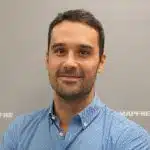SUSTAINABILITY| 04.11.2022
“People over 55 are very diverse, maybe more so than the younger generations”
After three decades of a successful professional career in law, Julia Randell-Khan now dedicates her professional life to championing senior talent in the context of longevity, which she feels is all too frequently overlooked. As a longevity entrepreneur, she co-founded The Purpose Xchange in 2021, she is a consulting fellow at the Stanford Center on Longevity and their New Map of Life project, and a senior fellow at the US non-profit CoGenerate.org. She was one of the guests invited to the recent conference on health and aging in Madrid organized by MAPFRE and the Geneva Association, the international association of insurance companies.
 In this interview, Randell-Khan advocates for a new, collective way of looking at aging and for taking the wealth of experience into consideration. She rejects the simplistic notions that people frequently have of older people, who are just as diverse as young people, if not more so. She encourages retired people, or those about to retire, to find a sense of purpose in life, as making a positive impact on others becomes a priority for many once they reach this stage, making them especially valuable. As she points out, studies show that people who are socially engaged live longer and more healthily.
In this interview, Randell-Khan advocates for a new, collective way of looking at aging and for taking the wealth of experience into consideration. She rejects the simplistic notions that people frequently have of older people, who are just as diverse as young people, if not more so. She encourages retired people, or those about to retire, to find a sense of purpose in life, as making a positive impact on others becomes a priority for many once they reach this stage, making them especially valuable. As she points out, studies show that people who are socially engaged live longer and more healthily.
Do you think we have a negative attitude about aging and the elderly? Does this need to change?
We need to change our attitudes, because we tend to view increased longevity as a “gray tsunami” that’s going to have a negative impact on the economy. But in reality, if you look at all the talent, wisdom, and input an older person can contribute to social change and the world of work, they can make a huge difference.
And we tend to view older people as a homogeneous group, which doesn’t make a lot of sense anymore. You can find a lot of diversity among people over 55, maybe more than among the younger generations. So we need to challenge anyone who says there’s a “gray tsunami” or a negative impact to increased life expectancy, because that simply isn’t true anymore.
Should companies and institutions make better use of senior talent?
Yes, absolutely. Especially now that many sectors are facing a considerable lack of talent, from engineering to health and beyond. We need to shift our focus to older workers and the value they can bring to the table and find creative ways to maintain those skills in our companies, by providing the option of more flexible work schedules or phased retirement options, for example. This would benefit everyone and would help older workers in particular to take on different responsibilities, thereby giving them the opportunity to stay connected to their jobs in different ways.
We also need to be aware of the benefits of having multigenerational teams. Numerous studies have shown that multigenerational teams are much more productive, because you maintain all the life experience that older people have accumulated, the difficult decisions they’ve made, their ability to analyze complex subjects, and young people really learn from that. There’s a collective wisdom that emerges from multigenerational teams that is incredibly valuable, and that’s why companies that don’t find creative ways of retaining older workers and supporting multigenerational workforces will be at a disadvantage.
You recently co-founded The Purpose Xchange, an initiative to help people nearing retirement or recent retirees find a sense of purpose in work and life. Can you explain what this concept of purpose means? Why is it so important in this phase of life?
Studies show that when people in their fifties start prioritizing how they can get more out of life, the desire to contribute to the greater good and to society in general becomes increasingly important. People want their actions to have meaning and a sense of purpose. The Purpose Xchange is designed to help people think about what’s important for them as they age, what changes they’d like to make in their work and their life, and what they imagine their future could look like. It takes time, it’s not something that can be done overnight, but it’s very important for a healthy longer life.
What challenges lie ahead in terms of intergenerational relations?
The media talks a lot about “intergenerational conflict”, and it’s a negative expression, I don’t think it’s something that exists. Journalists and politicians sometimes like to label culture wars and intergenerational inequalities, but in reality, every generation wants the same things. Everyone wants to be appreciated, to receive training, for investments to be made in their development, to enjoy good working conditions etc. Intergenerational debate is a good thing, but everyone’s voice should be given equal weight.
In your talk you mentioned the importance of socioeconomic factors. Do these inequalities affect people’s experience of increased longevity?
Yes, and we need to tackle these inequalities – they need to be part of the public health agenda. We need to provide incentives for companies to assist workers better manage their health, finances, savings, education and so on, so that these are not treated solely as issues at the individual level. Enterprises need to take on responsibility and support their people throughout their working lives. Finding ways to address problems stemming from inequality, in areas such as health, is going to be an incredibly important part of building a fairer society. Very different life expectancies can currently be found even within the same country, and this is unacceptable.
Can increased longevity also be seen as an economic opportunity?
There’s no question that it’s an opportunity, in my opinion, but it’s one that requires us to change our mindsets and let go of the many ingrained prejudices we have in terms of aging. Scientific developments challenge the way that we make decisions or create policies based on chronological age, because this might not be the best way to measure a person’s health or vitality. People should be considered in a holistic manner, because a person’s nutrition or the amount of exercise they do may be a better indicator of how we can take advantage of the opportunity of having a longer life, instead of only focusing on chronological age, which limits people, governments, and companies. We need to reform our legislation and our ways of working to keep up with changes in health and biotechnology, which are supporting healthier and longer lives.
RELATED ARTICLES:




